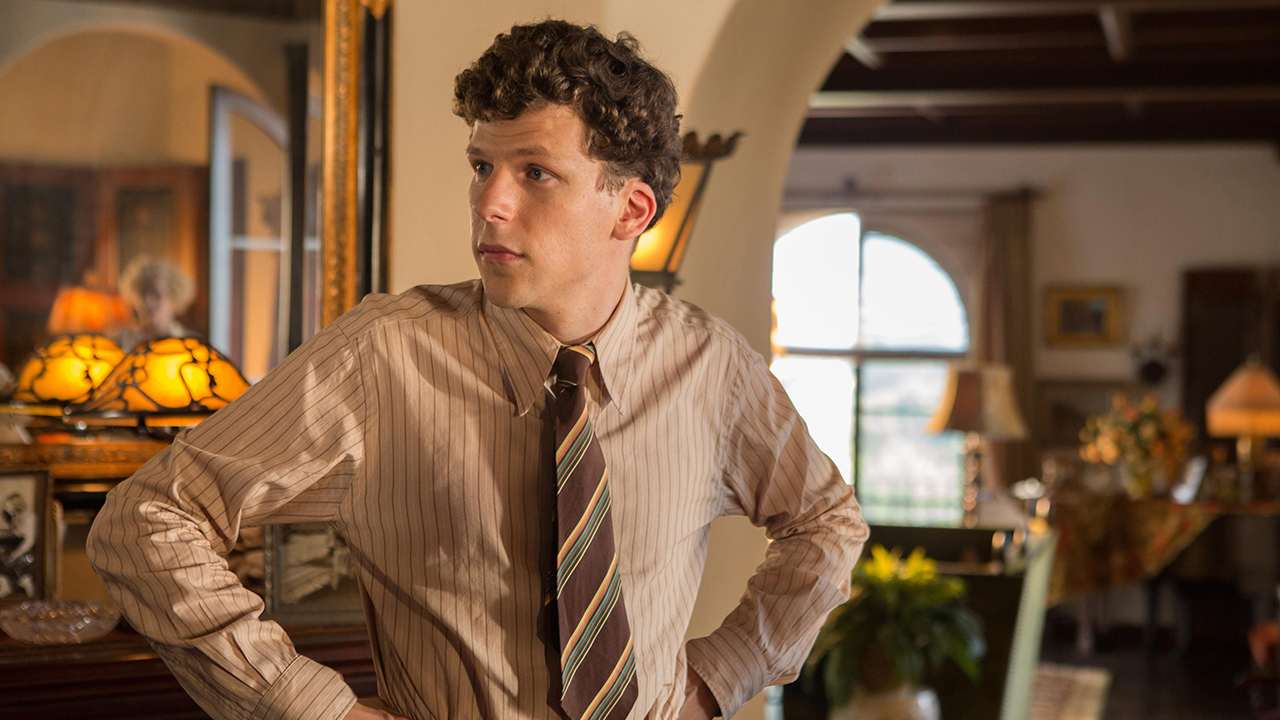Cafe Society reaction: Cannes 2016

Romance, heartache; hilarity, melancholy; white Windsor typeface credits on a black screen, a jazz soundtrack: there are certain things that you’re always going to get from a Woody Allen film, and Café Society, his 46th feature, is not about to make any sudden departures. Yet comprised as it is of vivid hues and vivacious spirit, it makes for Allen’s most peppy, purely enjoyable effort since… well, the last time he opened the Cannes Film Festival, with 2011’s Midnight In Paris.
That movie was set in 1920s Paris and danced a breathless Charleston with such artistic icons as Hemingway, Picasso, Dali, Eliot and the Fitzgeralds. Café Society is set in ‘30s Hollywood and namedrops such Tinseltown legends as Tracey, Garland, Flynn, Stanwyck, Davis and more as nervy Jewish kid Bobby Dorfman (Jesse Eisenberg) leaves lugubrious New York for sun-kissed Los Angeles.
It takes Bobby three weeks to get a meeting with his Uncle Phil (Steve Carell), a bigwig Hollywood agent, but it’s worth the wait: he’s given a job running menial errands and is handed over to secretary Vonnie (Kristen Stewart) to be shown around town. A friendship blossoms that rapidly accelerates into giddily fretful love on his part. She, perhaps, feels the same, but has a journalist boyfriend who turns out to be married and a whole lot more besides.
To spill more would be to do Café Society a disservice, but suffice to say there are complications and confusions, entanglements and Gordian knots. It’s all rather insubstantial and is Woody being Woody, with grandiloquent declarations of love ricocheting off sharply neurotic one-liners while sparkling socialites rub shoulders with blue-collar stiffs and colourful hoodlums (Bobby’s brother Ben, played by Corey Stoll, is a gangster). But it’s done with the easy confidence of someone who knows his cinematic universe inside and out, and boasts an infectious zest that belies Allen’s 80 years.
This last is all the more remarkable given Woody has here teamed with legendary Italian DoP Vittorio Storaro (The Conformist, Apocalypse Now), who, at 75 years of age, is no spring chicken himself. Shooting in digital (!), the pair bring an unexpected but welcome fluidity to action, the camera gliding around poolside parties and between tables at nightclubs to seek out the next beautiful face or yet another triumph of period production design.
Surfaces gleam, sunshine has the warm thickness of honey, and the blue surf laps at smooth beaches. Allen might feel repugnance for the LA of his time – see Alvy Singer’s reaction to going west in Annie Hall – but he clearly yearns for the Golden Age of American movies, with even the jibes feeling affectionate. Back in his beloved New York, meanwhile, shots of a bridge spanning the Hudson (echoes of Manhattan) or Stewart and Eisenberg riding a horse-drawn carriage through a dawn-lit Central Park are part romance, part nostalgia, all movie magic.
Of the two leads, Eisenberg is winning enough with yet another variation on his awkward-yet-cocky persona, but it’s Stewart who steals the show, her presence radiating off the screen despite her economy of movement, gesture and expression. Talking of the movie gods and goddesses that her boss fraternises with daily, she tells Bobby that she has no interest in being famous, preferring to be “life-sized”. It’s a charged moment, but Café Society suggests the Twilight star need not make a choice between magnetic screen idol and accomplished actress.
Bringing all the latest movie news, features, and reviews to your inbox
She has, of course, proven just this already in movies like Adventureland and Clouds of Sils Maria, but Café Society serves up Stewart’s best performance yet, with her every flitting thought picked up by Storaro’s luminous close-ups.
Jamie Graham is the Editor-at-Large of Total Film magazine. You'll likely find them around these parts reviewing the biggest films on the planet and speaking to some of the biggest stars in the business – that's just what Jamie does. Jamie has also written for outlets like SFX and the Sunday Times Culture, and appeared on podcasts exploring the wondrous worlds of occult and horror.


